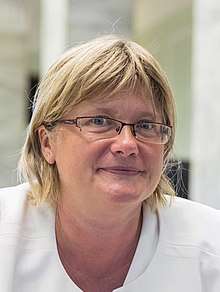Kinga Gál
Kinga Gál (born 6 September 1970) is a Hungarian politician and Member of the European Parliament (MEP) from Hungary. She is a member of Fidesz, part of the European People's Party.
Kinga Gál | |
|---|---|
 Kinga Gál in June 2018 | |
| Member of the European Parliament | |
| Assumed office 1 July 2004 | |
| Constituency | Hungary |
| Personal details | |
| Born | 6 September 1970 Cluj-Napoca, Romania |
| Political party | Fidesz European People's Party |
| Spouse(s) | Máté Gál |
| Children |
|
| Alma mater | Eötvös Loránd University |
| Website | gal.fidesz-eu.hu/en |
Early life and education
Gál was born in Cluj-Napoca, Romania.
Her education details includes:
- Institute for Comparative Human Rights, Strasbourg, France – diploma of international human rights (1993)
- Eötvös Loránd University, Budapest, Hungary – political science and law department (1994)
Career
Following are Gál's career highlights prior to becoming an MEP:
- Democratic Union of Hungarians in Romania, Bucharest, Romania – advisor (1991–1994)
- Teleki Foundation – researcher (1996)
- Government Office for Hungarian Minorities Abroad – analyst (1995), vice-chairman (2001–2002)
- European Centre for Minority Issues, Flensburg, Germany – international legal expert (1997–2000, )
- Hungarian Academy of Sciences – chief advisor to the president (2003–2004)
European Parliament
- Member of the European Parliament - since 2004
- The Parliament Magazine's annual MEP Awards - The Justice and Civil Liberties category Award in 2014
- Vice-President of the European People's Party - since 2015. October
Committees and delegations
- Committee on Civil Liberties, Justice and Home Affairs, vice-chair
- Subcommittee on Human Rights, member
- Minority Intergroup, chair
- Delegation for the African, Caribbean, and Pacific Group of States - European Union JOINT PARLIAMENTARY ASSEMBLY, member
Personal life
She is married to Máté Gál. They have four sons, Áron, Gergő, Zsombor and Márton.[1]
Publications
- "Önrendelkezés és önkormányzatiság Kossuth felfogásában, 1861" (in Hungarian). Pro Minoritate. Budapest. 1991.
- "Kisebbségvédelem a nemzetközi jogban, Magyar Kisebbség" ["Protection of Minorities in International Law – The Hungarian Minority"] (in Hungarian). II évfolyam, 1-2 szám, Kolozsvár. 1996.
- "A Román Parlament elé terjesztett kisebbségi törvény-tervezetek összehasonlítása" (in Hungarian). Magyar Kisebbség, III. évfolyam, 1-2 szám, pp. 244–255, Kolozsvár. 1997.
- "Bilateral Agreements in Central and Eastern Europe: A New Inter-State Framework for Minority Protection?". European Centre for Minority Issues Working Paper # 4. p. 22. Flensburg, Germany. May 1999.
- "Implementing the Framework Convention for the Protection of National Minorities". Co-author: María Amor Martín Estébanez. Flensburg, Germany, 12–14 June 1998. European Centre for Minority Issues Report #3. p. 96. August 1999.
- "The role of the bilateral treaties in the protection of national minorities in Central and Eastern Europe". Helsinki Monitor, Quarterly on Security and Cooperation in Europe. Volume 10, No.3, pp. 73–90, 1999.
- "Minoritätenprobleme in Ungarn und Rumänien". In Neuss, Beate, Peter Jurczek and Wolfram Hilz (eds.) Transformationsprozesse im suedlichen Mitteleuropa — Ungarn und Rumänien. Beiträge zu einem politik- und regional-wissenschaftlichen Symposium an der TU Chemnitz. Occasional papers no. 20, Tuebingen: Europäisches Zentrum für Föderalismus- Forschung. pp. 31–41. 1999.
- "Innere Selbstbestimmung — Aktuelle Autonomiekonzepte der Minderheiten in Rumanien". In Löwe, Tontsch und Troebst, Minderheiten, Regionalbewusstsein und Zentralismus in Ostmitteleuropa, Böhlau Verlag Köln Weimar Wien. 2000.
- "The New Slovak language law: Internal or External Politics?". Co-author: Farimah Daftary. European Centre for Minority Issues Working Paper # 8. pp. 71. Flensburg, Germany. September 2000.
- "The Council of Europe's Framework Convention for the Protection of National Minorities and its Impact on Central and Eastern Europe". Journal on Ethnopolitics and Minority Issues in Europe. Winter 2000.
- "Legal and Political Aspects of Protecting Minorities in Southeastern Europe in the Context of European Enlargement". In Wim van Meurs, Beyond EU Enlargement. Bertelsmann Foundation Publishers, Gütersloh.2001.
- "Aktuelle Autonomiekonzepte ungarischer Minderheiten in Ostmitteleuropa". In Adriányi, Glassl, Völkl, Borbándi, Brunner, Ungarn-Jahrbuch, Zeitschrift für die Kunde Ungarns und verwandte Gebiete. München. 2002.
- "Staatsangehörigkeit in Ungarn heute" ["Nationality in Hungary Today"]. In Osteuropa, Zeitschrift für Gegenwartsfragen des Ostens (in German), 52.Jg., 6/2002. Deutsche Verlags Anstalt, Stuttgart. 2002.
- Minority Governance at the Threshold of the 21st Century (ed.), European Centre for Minority Issues, Flensburg; Open Society Institute, Budapest. October 2002.
- "The European Parliament Intergroup for Traditional Minorities, National Communities and Languages, 2009–2014". Europäisches Journal für Minderheitenfragen, EJM 3–4 (2010). Co-author: Davyth Hicks.
- "National Minorities in Inter-State Relations: Commentary from Country Perspective". In National Minorities in Inter-State Relations, edited by Francesco Palermo — Natalie Sabandze. Leiden, Boston. 2011.
- "Az európai kulturális sokszínűség régi és új arcai". In Örökség a jövőnek — Nemzetközi Konferencia, Magyar Országgyűlés, 2010. November 25, előadások, Budapest. 2011.
- "Traditional Minorities, National Communities and Languages – the issues raised in the European Parliament Intergroup 2009-2011" (PDF format). Co-authors: Davyth Hicks, Eplényi Kata. Published by Kinga Gál, Brussels. December 2011.
gollark: Generally speaking, probably mathematical models, but the maths involved in quantum physics and whatnot is beyond my knowledge anyway.
gollark: Also that.
gollark: ... coherent explanations? Evidence?
gollark: I have no idea how quantum entanglement is related to "strain/inertia", which are mostly macroscale concepts, and it probably isn't.
gollark: Well, that sounds nonsensical.
See also
- List of Hungarian people
- Members of the European Parliament for Hungary 2004–2009
- Members of the European Parliament for Hungary 2009–2014
References
External links
- Personal profile of Kinga Gál in the European Parliament's database of members
- gal.fidesz-eu.hu/en, her official MEP website
- Works by or about Kinga Gál in libraries (WorldCat catalog)
This article is issued from Wikipedia. The text is licensed under Creative Commons - Attribution - Sharealike. Additional terms may apply for the media files.